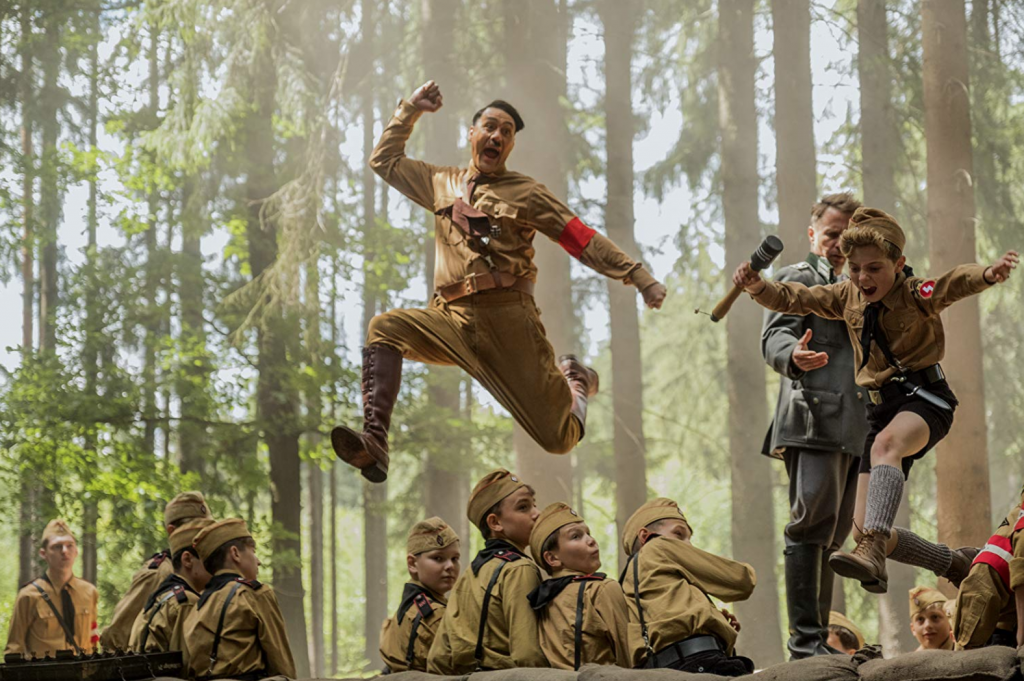Imagine a story about a young boy who wants to make a difference in the world. He doesn’t have many friends, so he confides in an imaginary friend for advice and encouragement. So far, such a premise sounds familiar, even unoriginal. But now add in a few key details: the boy is growing up in Nazi Germany, and his imaginary friend is Adolf Hitler.
Now we’re talking original — and bizarre.
Director Taika Waititi’s new satirical black comedy, “Jojo Rabbit,” instantly drags its writer onto thin ice: We are dealing with a fragile subject that, if mishandled, could make for a disastrous movie that disturbs and insults viewers.
It could be a disaster, but it isn’t. This turns out to be a brilliantly crafted piece that blends laugh-out-loud humor, tear-jerking tragedy, and heartwarming character.
Based on the novel “Caging Skies” by Christine Leunens, the film opens on Johannes “Jojo” Betzler (played by Roman Griffin Davis), a bright-eyed 10-year-old German boy who can barely tie his own laces, yet is obsessed with the Third Reich and its leader. Eager yet nervous to attend a Nazi youth camp, his imaginary friend Adolf appears to rally his spirits.
Instantly, we see the extremity of the portrayal: Imaginary Adolf Hitler acts as much like a 10-year-old as Jojo, because how else could a boy’s imaginary friend act? This is a jarring contrast to the familiar presentation of the Nazi dictator and what he stood for, which is usually a grim subject that is acknowledged as a shameful part of human history, and rightly so.
That perspective certainly has its place, and it need not be challenged through this film.
But Waititi’s bold move is to offer a new perspective that turns the former completely on its head, not to disrespect victims of World War II, but to mock the stupidity of evil. And he can do this because the story is told through the eyes of a child.
Jojo’s blind enthusiasm is that of an innocent, pre-pubescent boy who believes the strong men who tell him that monstrous creatures called Jews are threatening to take over society, and that the noble Aryans have been called to enact justice and defeat this terrible enemy.
The falsehood appeals to a young boy’s imagination, ambition, and fascination with action and adventure. From Jojo’s viewpoint, the whole thing is like a game, and the film’s satirical nature highlights the ridiculousness and futility of it.
It is also Jojo’s place as the protagonist that makes the caricature of Hitler truly funny. Because the character is an imaginary friend, the film implies that his portrayal is a naïve one, and thus avoids belittling the truly sinister ideology and actions of the actual Hitler.
At the same time, imaginary Hitler is the only version of Hitler that we see, so the caricature can consistently and effectively mock him and Nazism throughout the film.
One of the film’s sharpest moments of child-driven satire comes when Jojo discovers that his mother has been hiding a Jewish girl named Elsa (Thomasin McKenzie) in their attic.
Caught up in the boyish, fantastical worldview that Jews are dragons and Aryans are knights, Jojo is eager to make a valiant effort to vanquish the dragon. But of course, he is only a boy.
In his first encounter with her, he dashes away with a scream. His second approach involves using a pot as a helmet and trash lid as a shield. And when he finally confronts her to “tell me everything about your kind” … well, you’ll just have to watch it.
If the film were only satire and dark comedy, “Jojo Rabbit” would eventually fall apart, since it would fail to acknowledge the underlying seriousness of the subject. However many laughs the jokes might provoke, evil is still evil, Hitler really was Hitler, and the Holocaust still killed millions of people.
But once again, it is the fact that a child stands at the center of the plot that drives the success of the film. As Waititi reminds us, not only can a child have a wild imagination and extreme reactions, he can also form pure, intimate bonds with others.
This reality is made especially clear in Jojo’s relationship with his mother, Rosie, brilliantly portrayed by Scarlett Johansson, and his interaction with Elsa. With his mother, we see him throw the typical tantrum, but an instant later show her tender devotion, which makes for some of the most delightful and most painful scenes of the film.
With Elsa, his childlike curiosity and openness makes for a believable transition from fear and hatred to trust and friendship. With every moment of raw human connection that is woven into the story, Waititi chips away at the satirical layer and unveils the truth that Jojo must soon discover: The war is no game but a true fight for life and love.
“Jojo Rabbit” is certainly not a children’s movie, as is made clear from the violent themes and occasional vulgar language. Nevertheless, we have the endearing, mysterious nature of children to thank for this quirky, fresh presentation of one of the hardest moments of human history to tell. It provokes the mind and captures the heart, and for that, it is a film not to be overlooked.
“Jojo Rabbit” is showing in select theaters across the country and is scheduled for a full release Nov. 8.

